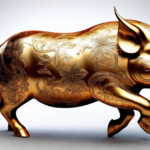Throughout history, our ancestors accumulated a wealth of knowledge about navigating life’s challenges and seeking good fortune. This wisdom has been passed down through generations, manifesting in various proverbs and customs that remain prevalent today.
One such intriguing belief centers around the idea that encountering certain occurrences when leaving home could foretell impending misfortune. These seemingly insignificant events carried profound meanings for our ancestors. Let’s delve into five of these peculiar signs and unravel the stories and potential explanations behind them.
A Dog Blocking Your Path – A Silent Warning from Man’s Best Friend

Dog Blocking Your Path
In traditional beliefs, dogs are revered as loyal companions and trusted guardians. However, our ancestors held an intriguing perspective: if a seemingly friendly dog suddenly blocked your path, it could be a sign of impending doom.
Dogs possess superior hearing and smell compared to humans, enabling them to sense subtle changes that elude our perception. In ancient times, people relied on dogs to warn them of dangers such as wild animal attacks or natural disasters. Thus, any unusual behavior from a normally gentle dog would arouse particular caution.
This belief remains relevant in modern times. For instance, in areas prone to earthquakes, it has been observed that dogs and other animals may exhibit signs of anxiety or abnormal behavior before seismic activity occurs.
While we should avoid superstition, paying attention to the unusual behavior of animals can help us identify potential dangers. Instead of viewing a dog blocking our path as bad luck, we should pause, carefully observe our surroundings, and remain vigilant to potential risks that we might otherwise overlook.
Fish Jumping Out of Water – A Prelude to an Earthquake
In traditional culture, fish symbolize wealth and prosperity. However, our ancestors held a contrasting belief: if fish in a pond suddenly started jumping out of the water erratically, it signified impending disaster, particularly foretelling an earthquake.
This seemingly contradictory perspective reveals the keen observations of our ancestors regarding subtle changes in nature. Fish are highly sensitive to even the slightest alterations in their aquatic environment.
Before an earthquake occurs, subtle shifts in the earth’s crust or the release of certain gases may take place, going unnoticed by humans but triggering abnormal reactions in aquatic life.
Through long-term observation, ancient people linked abnormal fish behavior with natural disasters like earthquakes, thus forming this unique warning system. While modern technology has improved earthquake predictions, the behavior of fish remains a fascinating aspect to consider.
This wisdom reminds us of the importance of respecting nature and staying attuned to our surroundings. When witnessing fish jumping out of water unusually, we should be vigilant and pay attention to recent geological forecasts.
The ancient wisdom underscores the interconnectedness of all life in nature. By observing these seemingly minor changes, we can gather valuable information that surpasses our expectations.
Bird Droppings – Harbinger of Bad Luck or Good Fortune?
In many cultures, having bird droppings land on your head is considered a sign of bad luck. Interestingly, some believe it foretells impending good fortune. This contradictory interpretation reflects how people perceive and cope with unexpected events.
Practically speaking, being hit by bird droppings is certainly unpleasant, soiling one’s clothes and ruining one’s day. Our ancestors viewed it as a bad omen, perhaps symbolizing unexpected misfortune, like a bucket of cold water being poured on us.
However, the belief in transforming this unfortunate event into good luck showcases people’s positive outlook when facing adversity. Some argue that the likelihood of being hit by bird droppings is minuscule, so this “bad luck” actually predicts good fortune, such as winning the lottery.
Regardless of the interpretation, this belief reminds us that maintaining a positive attitude is crucial when facing life’s surprises. Instead of wallowing in sadness or complaining, view it as an opportunity for self-reflection, adjust your mindset, and prepare to tackle the next challenge.
The wisest course of action in this situation is to remain calm, clean up quickly, and carry on. Ultimately, what determines our fate is not these minor incidents but our attitude and response to them.
Stepping in Dog Feces – A Turn of Good Luck?
The saying, “stepping in dog feces,” holds varying meanings across different cultures. In some places, it is associated with impending good luck.

Sign of Bad Luck
However, in the ancient belief we are discussing, it is considered a bad omen. This seemingly contradictory perspective reflects how people interpret unexpected occurrences.
Practically speaking, no one wants to step in dog feces. It not only soils your shoes but also leaves an unpleasant odor, affecting your mood.
Our ancestors viewed it as a bad omen, perhaps because it symbolized “impurity” and “uncleanliness,” foretelling potential misfortunes ahead.
However, the belief in transforming this unpleasant event into a “dog barking at the wrong tree” moment showcases people’s desire to find a silver lining in unfortunate events. This perspective suggests that once you’ve encountered such bad luck, your fortune can only improve.
Regardless of the interpretation, this belief underscores the importance of maintaining a positive and optimistic attitude when facing life’s minor setbacks. Instead of dwelling on petty annoyances, view them as reminders to be more cautious on your journey ahead.
The prudent course of action in this situation is to clean up calmly and carry on with a positive mindset. By doing so, we can face future challenges without letting minor incidents affect our overall destiny.
Animals Crossing Your Path – A Cautionary Sign or Mere Coincidence?
In modern times, especially for those who enjoy road trips, encountering animals crossing the road is not uncommon.
However, our ancestors held an intriguing belief about this situation, considering it a warning sign that warranted caution. This perspective reflects their reverence for nature and their understanding of the relationship between humans and the natural world.
From a practical standpoint, encountering animals on the road demands extra caution. Whether it’s a rabbit, an owl at night, or a herd of deer during the day, their sudden appearance can lead to road accidents. Thus, our ancestors viewed this as a bad omen, possibly due to safety concerns.
However, there’s a deeper meaning to this belief. According to ancient wisdom, animal behavior is often intricately linked to changes in nature. For instance, the unusual migration patterns of certain animal species can signal impending natural disasters.
Therefore, when our ancestors witnessed animals crossing their path, they became particularly vigilant, contemplating whether these occurrences signified underlying changes in nature. In modern times, while we need not be overly superstitious, this belief still offers food for thought.
It reminds us to respect nature and observe environmental changes. When encountering animals on the road, we should not only slow down or stop for safety but also reflect on whether our actions are impacting the natural environment.
This ancient wisdom underscores the indivisible connection between humans and nature. By observing and respecting other creatures in the natural world, we can gain insights far beyond our expectations.
The beliefs passed down by our ancestors, though seemingly superstitious, encapsulate profound wisdom. They remind us to stay vigilant in our daily lives, respect nature, and pay attention to subtle changes around us.
These seemingly ordinary occurrences may hold hidden omens, helping us navigate life’s challenges and seek good fortune. However, most importantly, these beliefs teach us to face life’s unexpected events and trials with optimism and a positive outlook.
Whether it’s good luck or bad, what ultimately determines our destiny is our attitude and actions.
The information in this article is for reference and reflection only!
“The Ancient’s Warning: Unveiling the Hidden Meanings Behind Gift-Giving Taboos”
“When it comes to wedding gifts, it’s important to steer clear of giving umbrellas as presents, as this is considered inappropriate in many cultures. It’s always best to be thoughtful and considerate when choosing a gift to avoid any potential embarrassment or negative associations. Similarly, it’s crucial to dress and present oneself appropriately at funerals, showing respect for the somber occasion.”





































